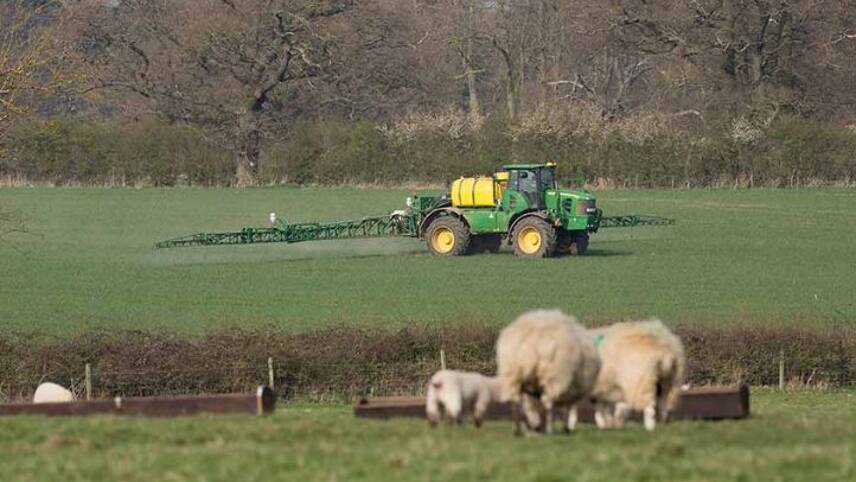Register for free and continue reading
Join our growing army of changemakers and get unlimited access to our premium content

The strategy is expected to be covered later today
While some have pointed to longer growing seasons and a wider range of crops becoming viable in northern Europe as benefits from temperature rises, the effects on rainfall and extreme conditions mean farming is already suffering.
Heatwaves this year and last year have exposed the vulnerability of agriculture, according to the assessment from Europe’s green watchdog, the European Environment Agency.
Across Europe, the overall economic loss to agriculture from climate change is likely to be as high as 16% by 2050, though there will be large regional variations, and some crops will be hit harder than others.
The EEA report was published as the Met Office confirmed that this year’s summer has been one of the wettest and hottest on record for the UK.
Tim Legg, of the Met Office’s national climate information centre, said: “Summer 2019 was the 12th warmest on record since 1910, but was also relatively wet. Previously hot summers have been largely dry but this was the seventh wettest overall in a series dating back to 1910.”
Wet weather in the summer poses a problem for farmers, as early in the summer it can disrupt crop development and later on crops such as grains and some fruit and vegetables require a dry period for ripening before harvest.
This year’s wet summer came after last year’s record-breaking drought, which had left soils parched. Scotland had its second wettest summer in the recent record, as northern areas of the UK were hit by heavy rainfall in August, but southern England and Wales had heavy rainfall in June. The wettest counties – Cheshire, Northumberland and Derbyshire – had 173% to 179% more rainfall than the long-term average.
While southern Europe has been worst affected by droughts and excess heat, which can inhibit the growth of crops – and the report forecast land prices in the region could drop by 80% by the end of the century as a result – the main dangers for the north are in extremes of weather and sudden disasters such as flooding. Hundreds of homes were evacuated in Lincolnshire in June after some areas of England received a month’s worth of rain within a few days.
Farmers are still not being helped to make the preparations necessary to cope with the extremes of weather, according to the EEA report.
Hans Bruyninckx, the executive director of the EEA, said: “New records are being set around the world due to climate change, and the adverse effects are already affecting agricultural production in Europe, especially in the south. Despite some progress, much more must be done to adapt by the sector itself, especially at farm level, and future EU policies need to be designed in a way to facilitate and accelerate transition in this sector.”
The EEA recommended much greater emphasis on measures to help farmers adapt to higher temperatures and changing rainfall patterns, through changing their practices, diversifying their crops, saving water and using technology such as weather data more effectively. Precision farming, whereby fertilisers and pesticides are used in small amounts rather than widely sprayed, can also help, along with the use of crops adapted to hotter conditions, and more emphasis on the benefits of forestry.
After Brexit, the UK will be responsible for its own policies on adapting to the climate crisis. Gareth Morgan, the head of policy at the Soil Association, said: “This alarming report adds further weight to the UK Committee on Climate Change’s recent warning that the government is hiding from the risks of climate change and failing to put adaptation plans in place for agriculture.”
He said it was a matter of urgency for farmers to get help to adapt to the effects of heating, as well as help to reduce greenhouse gas emissions. “They [farmers] are at the frontline and seeing impacts already. Resilience is key and soil health must be at the heart of that. Soils hold three times more carbon than the atmosphere, and are vital for drought and flood protection,” he said.
Morgan also called for the government to support farmers to move to more environmentally benign agriculture, which he said would have beneficial effects on wildlife and the natural world as well as on human health. “It is time to join the dots between climate and the biodiversity and diet crises.”
The EEA assessment found a “cascade of impacts”, whereby a changing climate affected yields and the quality of the end product, and this, in turn, made a big difference to prices, trade patterns and the viability of farms. This could lead to the intensification of agriculture in some areas and the abandonment of farms in others.
Europe’s food supply is not in immediate danger, the report found, but increased food demand around the world from growing populations and the impact on yields from climate change may force prices up in the future.
A spokesperson for the Department for Environment, Food and Rural Affairs (Defra) said: “We are taking robust action to improve resilience to climate change across the whole country. Our agriculture bill will provide financial assistance for farmers to [reduce emissions] and adapt to climate change. We will also offer financial assistance for farmers, foresters and growers to invest in the equipment, technology and infrastructure needed to increase sustainable productivity and improve the environment.”
Fiona Harvey
This article first appeared on the Guardian
edie is part of the Guardian Environment Network


Please login or Register to leave a comment.